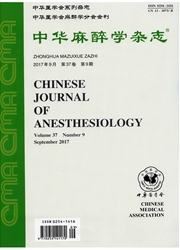

 中文摘要:
中文摘要:
目的评价丙泊酚后处理对脂多糖(LPs)诱导大鼠脑组织小胶质细胞炎性反应的影响。方法原代培养sD大鼠全脑小胶质细胞,以1×10^5个/ml密度接种于24孔培养板(1ml/孔),100个培养孔,采用随机数字表法,将其分为5组(n=20),正常对照组(c组)常规培养;L组加入1μg/ml LPS孵育24h;P25组、P50组和P100组于1μg/ml LPS孵育24h时加入丙泊酚,终浓度分别为25、50、100μmol/L。于丙泊酚孵育1h时收集细胞,采用RT-PCR法检测诱导型-氧化氮食酶(iNOS)mRNA、环氧化酶-2(COX-2)mRNA、肿瘤坏死因子-α(TNF-α)mRNA和自细胞介素-1β mRNA的表达水平;收集上清液,采用Griess法测定-氧化氮(NO)浓度,采用酶联免疫吸附法测定前列腺素E2(PGE2)、TNF-α和IL-1β的浓度。结果与C组比较,L组iNOSmRNA、COX-2mRNA、TNF-α mRNA和IL-1βmRNA的表达及上清液NO、PGE2、TNF-α和IL-1β的浓度升高(P〈0.01);与L组比较,P50组和P100组iNOSmRNA、COX-2mRNA、TNF-αmRNA和IL-1βmRNA的表达及上清液NO、PGE2、TNF-α和IL-1β的浓度降低(P〈0.05或0.01),而P2,组上述指标差异无统计学意义(P〉0.05)。结论50、100μmol/L丙泊酚后处理可抑制LPS诱导大鼠脑组织小胶质细胞炎性反应。
 英文摘要:
英文摘要:
Objective To evaluate the effects of postconditioning with propofol on lipopolysaccharide (LPS)-induced inflammatory responses of microglial cells in rat brain tissues.Methods The primary cultured mi- croglial cells in brain tissues of Sprague-Dawley rats were seeded in 24 multi-well plates at a density of 1 × 10^5 cells/ml, and the microgtial cells of 100 wells were randomly divided into 5 groups ( n = 20 each) using a random number table: control group (group C), LPS group (group L), and propofol 25, 50 and 100 μmol/L groups (P25, P50, P100 groups). The cells were cultured routinely in group C. LPS 1 μg/ml was added and the cells were incu- bated for 24 h in group L. In P25 , P50 , and P100 groups, when the cells were incubated for 24 h with LPS 1μg/ml, propofol with the final concentrations of 25, 50 and 100 μmol/L was added, respectively. The cells were collected at 1 h of incubation with propofol for determination of the expression of inducible nitric oxide synthase (iNOS) mR- NA, eyelooxygenase-2 (COX-2) mRNA, tumor necrosis factor-α (TNF-α) mRNA and intedeukin-1β (IL-1β) mR- NA (by RT-PCR). The supernatant was separated for determination of the concentrations of nitric oxide (NO) (by Griess method) and prostaglandin E2 (PGE2), TNF-α and IL-1β (by ELISA). Results Compared with group C, the expression of iNOS mRNA, COX-2 mRNA, TNF-α mRNA and IL-1β mRNA was significantly up-regulated and the concentrations of NO, PGE2, TNF-α and IL-1β in the supernatant were increased in group L (P 〈 0.01 ). Compared with group L, the expression of iNOS mRNA, COX-2 mRNA, TNF-α mRNA and IL-1β mRNA was sig-nificantly down-regulated and the concentrations of NO, PGE2, TNF-α and IL-1β in the supernatant were decreased in P50 and P100 groups (P 〈 0.05 or 0.01), while no significant change in the indexes mentioned above was found in P25 group ( P 〉 0.05). Conclusion Postconditioning with propofol 50 and 100μmol/L can inhibit LPS-induced
 同期刊论文项目
同期刊论文项目
 同项目期刊论文
同项目期刊论文
 期刊信息
期刊信息
